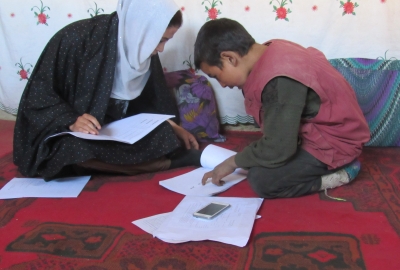
ALSE research briefs are periodic publications that provide updates, lessons, and key findings on our research activities. When citing our work, we ask you to please use the following citation:
Burde, D., J. Middleton, and C. Samii. [insert copyright year]. Assessment of Learning Outcomes and Social Effects of Community-Based Education: A Randomized Field Experiment in Afghanistan. [Insert research brief title]. New York: Steinhardt School, New York University.
Volume 1
Issue 1 - Community-Based Education in Afghanistan: A Primer
This was our first issue in which we provided an overview of our research project and the research methods seminars that staff provides to the Afghan Ministry of Education as well as staff from non-governmental organizations.
Click on the following links to view this issue in ENGLISH, DARI, and PASHTO.
Issue 2 - Cost Effectiveness Analysis
In this second issue, we describe the purpose and general approach to cost effectiveness analysis (CEA) and how the ALSE team has incorporated in their study of community-based education in Afghanistan.
Click on the following links to view this issue in ENGLISH, DARI, and PASHTO.
Issue 3 - Evaluating Trade-Offs in Teacher Recruitment
The third issue of the research brief discusses efforts in improving teacher quality and ways of measuring it.
Click on the following links to view this issue in ENGLISH, DARI, and PASHTO.
Issue 4 - Prioritizing CBE Resources by Age Groups
The fourth issue of the research brief discusses the potential benefits of continuing a CBE class with an advanced curriculum or starting a new CBE class with the original curriculum by examining enrollment data by age for both boys and girls.
Click on the following links to view this issue in ENGLISH, DARI, and PASHTO.
Volume 2
Issue 1 - Community Participation and the Sustainability of Rural Education in Afghanistan
This issue examines the relations, resources, and capacities that inform community contributions to delivering formal education, starting with the perspectives of government education officials. It further explores survey data on the willingness of communities to contribute to education and the impact this may have on the sustainability of community managed education in rural areas of Afghanistan.
Click on the following links to view this issue in ENGLISH, DARI, and PASHTO.
Issue 2 - Community Capacity to Co-manage Primary Education
In this issue, we examine the capacity of village-level community institutions to co-manage the delivery of quality primary education in rural communities. We discuss our initial findings from management assessment surveys conducted in 180 villages in Afghanistan focusing on the key functional practices of three community institutions: Community Development Councils (CDCs), Education Subcommittees (ESs), and School Management Shuras (SMSs).
Click on the following links to view this issue in ENGLISH, DARI, and PASHTO.
Issue 3 - Institutional Management Practices of Village Shuras in Rural Afghanistan
Competencies and Areas for Improvement - This issue follows the release of our Phase Two Baseline Report and provides a more detailed look at the management practices of village shuras. Using data from surveys conducted with 179 Community Development Councils, 220 Education Subcommittees, and 114 School Management Shuras, we spotlight the shuras' management competency levels. This brief also includes a list of recommendations for future shura capacity building.
Click on the following links to view this issue in ENGLISH, DARI, and PASHTO.
Issue 4 - Teacher motivations and implications for models of Community-based Education in Afghanistan
In this research brief we examine what motivates CBE teachers to do their jobs well. This is a group that has been understudied to date. From qualitative analysis of interviews with CBE teachers, we examine four key motivating factors: salaries, classroom resources, training and professional development, and organizational processes and procedures. We conclude with a list of recommendations for ways that NGOs and the Ministry of Education (MoE) can support CBE teachers in their work. We discuss possible implications as CBE teachers look to integrate into the formal MoE system.
Click on the following links to view this issue in ENGLISH, DARI, and PASHTO.
Volume 3
Issue 1 - Enhancing female representation in the education sector
In this research brief, we explore the factors influencing women’s participation and employment in the education sector of Afghanistan. This brief is based on in-depth qualitative analysis of semi-structured interviews with women who work at all levels of the education system in Afghanistan, including district, provincial, and national levels. We conclude this issue with a list of promising practices for ways to support and improve women’s representation in the education workforce.
Click on the following links to view this issue in ENGLISH, DARI, and PASHTO.
Issue 2 - Capacity building for village level community institutions
This research brief outlines ALSE’s capacity building training activities with village-level community institutions. It shows the results of descriptive analysis on satisfaction, reputation, and trust in local shuras among villagers based on our survey with 5,130 heads of households across the six ALSE provinces in fall 2017. This brief also includes key lessons learned that others may find helpful in planning and implementing similar efforts for rural and remote communities in Afghanistan.
Click on the following links to view this issue in ENGLISH, DARI, and PASHTO.
Issue 3 - Can Communities Take Charge? Sustainability and CBE
This brief presents an executive summary of the Phase II Endline Report, including key results on the effects of a CBE sustainability model on education attendance, children’s learning achievement, and other key indicators compared to those of the NGO model. This brief also presents our recommendations on how this CBE sustainability model can be strengthened.
Click on the following links to view this issue in ENGLISH, DARI, and PASHTO.

